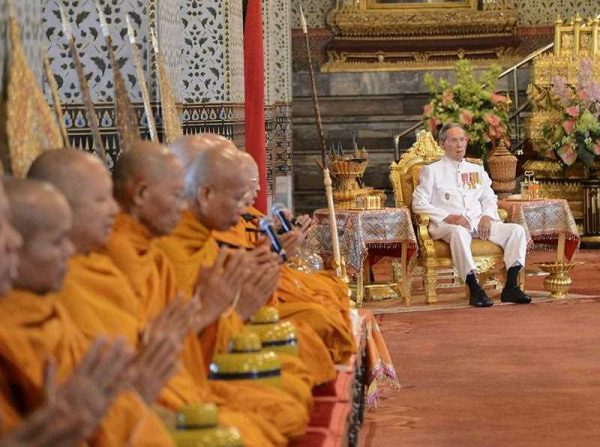In place of the democratically-elected government, the junta invoked Article 44 of the provisional constitution its lawyers had drafted following the coup. The sweeping powers of Article 44 confers General Prayut Chan-ocha and the National Council for Peace and Order with absolute power — even if the actual use of the powers allowed under the article is circumscribed by political realities. Under martial law the actions of the regime were at least subject to the military courts. Now there is no legal oversight whatsoever. Thailand has reverted to an absolutist state.
Within weeks of receiving royal endorsement to use Article 44, the junta-appointed Constitutional Drafting Committee released the draft constitution, which the military regime requires to be in place before new elections can be held. As expected, the new constitution has been designed with the sole aim of weakening the role of elected politicians, political parties, and the National Assembly, in favour of unelected bureaucrats or kha ratchakan (servants of the king).
Since political meetings giving the public the opportunity to discuss and debate the draft constitution are prohibited by the dictatorship the reaction has been muted. But even the military’s own allies, the conservative Democrat Party, have publically expressed reservations about the constitution, suggesting that its adoption may be problematic. Pre-empting opposition to the charter the military has warned that if a redrafting process is required Thailand’s return to ‘democratic’ rule will be delayed even further.
The essence of the political conflict remains unchanged since it began in late 2005, when a movement backed by Thailand’s conservative elite ousted the elected government of the popular Prime Minister Thaksin Shinawatra. Today, a power bloc — consisting of the military, the bureaucracy, and Sino–Thai banking and industry, given political legitimacy and ideological unity by the monarchy — continues its struggle to preserve its political supremacy. This power bloc is threatened by the politicisation of Thailand’s rural and urban working classes — whose political potential Thaksin was the first to recognise and exploit.
The power bloc wages this struggle in ideological terms in the name of ‘reform’. But what is endlessly debated in the pro-establishment media and by conservative intellectuals as a moral issue — how to solve the problem of corrupt politicians, vote-buying, ignorant voters — is in reality a political issue: how to accommodate the entry of millions of Thai citizens into Thailand’s political process. The draft constitution’s oft-stated desire to rid Thai politics of the former is really an attempt to block the latter.
In the same way, the chronic hysteria surrounding the future of the monarchy can be understood as a gauge of the level of fear that the power bloc feels about its political future, especially with the imminent passing of King Bhumibol Adulyadej and uncertainty surrounding the succession. As many observers of Thailand’s politics have argued, the succession has been a factor in the conservative political backlash of the last decade.
But the reversion to absolute rule under the current military regime could not have been possible without a culture of absolutism that was revived by the Thai state during the reign of King Bhumibol. The monarchy — since its return to political significance in the late 1950s, after it came close to abolition in the 1930s and 1940s — has kept alive the dream of absolute rule by the morally virtuous, a powerful Buddhist idea which dates from the days of the absolute monarchy.
This culture of absolutism pervades the senior levels of the military, the bureaucracy, the judiciary, the Buddhist Sangha, and all levels of Thailand’s education system. In its schools and mass media Thailand’s democratic history has been largely erased or heavily censored. Democracy is a gift bestowed on subjects by the Thai kings, to be given or taken away when necessary. Royalist constitutional lawyer and chair of the Constitutional Drafting Committee, Bowornsak Uwanno, argues that Thailand differs from other countries in that sovereignty is shared between the people and the monarch, but — after a coup — sovereignty reverts back to the king.
As a result, in Thailand the principle of citizenship is exceedingly weak. Normative models of good manners are based on the servile courtier. The Buddhist doctrine of kamma — which has arguably been revived under the present reign — subtly justifies and naturalises social inequality. Notions of the political and legal equality of Thai citizens are correspondingly undeveloped. As in all dictatorships, key political terms like ‘democracy’ are emptied of any meaning, but instead are mobilised purely for the political ends of the regime.
Eight decades after the overthrow of the absolute monarchy, Thailand remains haunted by the ghost of absolutism.
Dr Patrick Jory is a Senior Lecturer in Southeast Asian History at the School of Historical and Philosophical Inquiry at the University of Queensland.


Dr Jory hits “the nail on the head’: the people of Thailand are subjects before they are citizens. The original sin, if there is one, dates to the end of the absolute monarchy in the bloodless coup of 1932. The two co-founders of the People’s Party that initiated the coup: the cosmopolitan Pribi Banamyong, a French trained law professor with democratic ideals, and Phibun Songkram a nationalist military officer. Pribi ,who became Prime Minister briefly, sought the creation of a representative system based on the rule of law. Phibun, who became Thailand’s first military dictator sought to capture the absolute power of the monarchy and distribute to a larger elite of ‘virtuous men’ (military and civilian bureaucrats). However after some decades as the latter were unelected their power needed to be legitimized by reference to a higher authority, the monarch.
As the red shirt-yellow shirt confrontation of recent years demonstrates, the legitimacy of the ballot box continues to compete with that derived from forms of paternal, somewhat benevolent, despotism.
Jory is potentially the only relevant, sound-of-mind, and academic critic of the monarchy left. The rest are all emotional nut bags! Equally as bad as the irrelevant monarchy and her supporters. Well written!